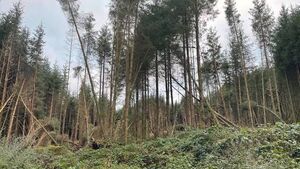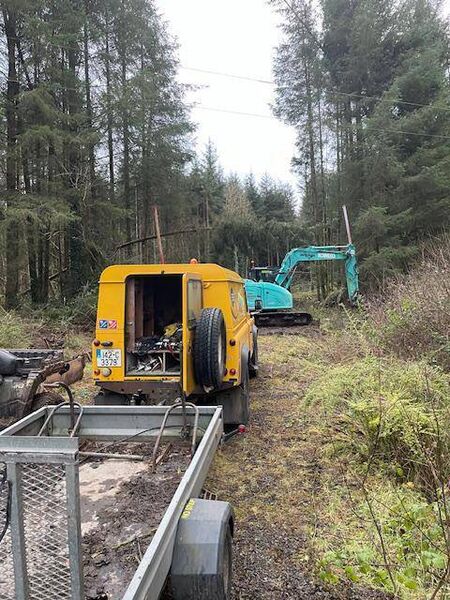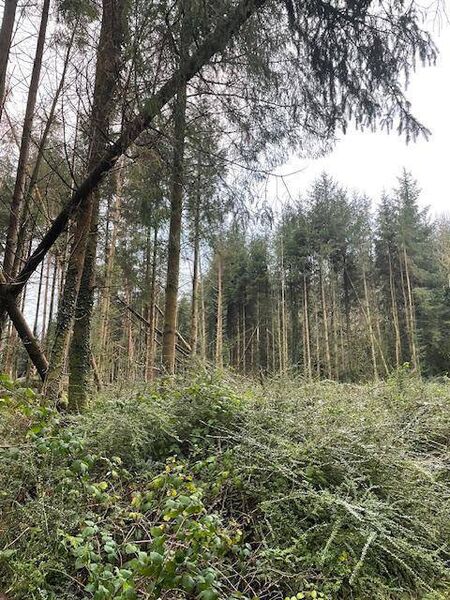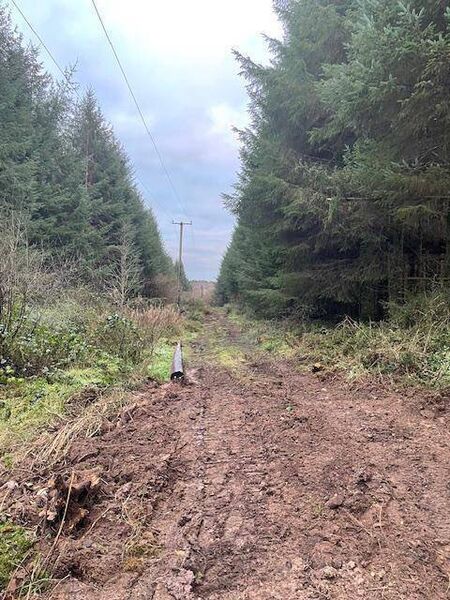Time someone saw the wood from the trees

Large trees swaying in the breeze ready to fall.
Storm Darragh swept through the country in recent weeks and within a few short hours it had left a trail of destruction in its wake.
Fallen trees, and widespread power and water outages caused misery for thousands of people, many up to the weekend.
In an increasingly electrified world, we seem to have not only overlooked, but turned a blind eye to that dance between nature and infrastructure.
Storm Darragh showed us that we need to get the steps right and urgently.

In my own case fallen trees in a nearby forestry caused severe damage to the power line, which left us without power for four days. The electricity outage was compounded by a two day water outage.
Before continuing, I have to pay tribute to those workers in Uisce Eireann who worked to get our water supply back and to the heroes with ESB Networks who worked in the most challenging of conditions, cutting through vegetation to restore our electricity line. With a growing sense of public frustration, these workers often get the brunt of public ire, but they deserve nothing but credit for their trojan work. In this case superheroes came in yellow vans and trucks.

Trees growing too close to power lines can pose multiple problems. A number of months ago following another outage I was informed by an ESB Networks worker, who had worked on restoring the line, that should another storm blow our way our line, already seriously compromised, would cause major issues and so his warning came to pass when Darragh blew through the wood. This time Darragh felled dozens of trees and has how left a wind tunnel through the forest opening us up to more and more outages as already compromised trees sway dangerously even in a light breeze. It’s only a question of when not if one of them falls on the line again.
After the last outage I did make contact with Coillte and explained my case. It would appear that the ground on which the forest is located in owned by Coillte, but the forest itself is owned by a private company and even if agreement was reached on felling a felling licence could take a year of more to obtain.
Fallen trees I’m reliably informed were responsible for over 90 percent of the recent power outages. We were out four days, but what about the people of North Roscommon and Leitrim who were out for a week?

We are all aware of our climate responsibilities and our carbon footprints, but the reality for people living in rural Ireland is that prolonged power outages are now rooted in forestry planted over 20 and 30 years ago. These outages are becoming more frequent and lasting longer as workers struggle through difficult terrain to access the lines. The simple truth is that if householders in any of our larger towns and cities were out of power and water for long periods of time it would be a national topic of conversation. Rural communities are tolerant. The gesture of a few hot dinners was a nice one from the ESB, but it’s cold comfort for the thousands of people who will face this scenario again and again.
Locally several politicians have been raising the issues with Roscommon County Council, but the council hasn’t the funds nor the jurisdiction to act.
So who has the power? A couple of questions the public are demanding answers to.
Why is there so little maintenance of power lines through forestry?
Why can’t power lines be re-routed where there is an obvious danger to supply?
Why are forestry plantations allowed to grow out of control?
Why do you not need planning permission for forestry, yet people in rural areas can’t even build a wall without it?
If a forest is due to be felled why does a felling licence take so long to get?
These questions have the people of rural Ireland stumped.
We have lived 25 years on our road and in that time, apart from making an entrance to the forestry, no real work has been carried out there, to my knowledge.
I have heard all the stories, about set back distances, way leaves etc etc. Frankly I’m not interested in these details. I’m interested in action, joined up thinking and foresight. On this occasion I told Coillte not to insult my intelligence by giving me a standard response, so far they haven’t given me any.
To add to our problems coming down the line, the government’s climate change advisors say in just 15 years Ireland needs to be completely free of fossil fuels. That means no more petrol and diesel cars and trucks. It means no more oil central heating, coal fires or gas boilers.
It means generating electricity entirely from wind farms, solar parks and other renewable sources. But they say we can’t wait until 2039 to make the transformation.
The Climate Change Advisory Council says we would need to ban the sale of petrol and diesel cars as early as next year and get rid of home heating oil and coal in five years.
They say the shift required will be “the most significant change since the foundation of the State”.
It will be “highly disruptive”, “initially expensive” and will require “strong political leadership”, they warn.
However, failure to act will bring “profound costs to the Irish economy and to the people of Ireland”.
The theory of all of this is wonderful. The problem is these measures will impact most on those of us who live in rural Ireland. What would we have done in recent weeks without gas burners, those of us lucky enough to have gas hobs to boil a kettle, or open fires to try and heat a room as temperatures dipped well below zero? It reminds me of the often quoted Marie-Antoinette response when told that her starving peasant subjects had no bread and she responded “let them eat cake”.
It also brings to mind a solution from a former politician that went viral when he suggested that we all car pool in rural Ireland, suggesting that a village of 300 people could operate on 30 cars with car-pooling schemes.
There is a growing disconnect in this country between the reality on the ground for those in rural Ireland and those who make the decisions. The lack of investment in basic infrastructure has left a storm chill blowing west, north, and south of the M50. The next storm will be blowing in from the Atlantic before we know it and those of us who live close to or whose power lines go through forestry will be back to square one. It’s past time those who have the power to do something start doing it and start seeing the wood from the trees.





